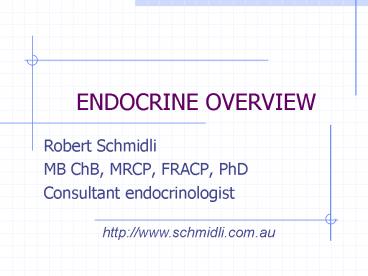ENDOCRINE OVERVIEW - PowerPoint PPT Presentation
1 / 32
Title:
ENDOCRINE OVERVIEW
Description:
He appears to have acromegaly. Signs: Thickened soft tissues ... Acromegaly. Growth hormone release. A 27 year-old lady complains of amenorrhoea for 6 months ... – PowerPoint PPT presentation
Number of Views:96
Avg rating:3.0/5.0
Title: ENDOCRINE OVERVIEW
1
ENDOCRINE OVERVIEW
- Robert Schmidli
- MB ChB, MRCP, FRACP, PhD
- Consultant endocrinologist
http//www.schmidli.com.au
2
Case 1
- A 67 year old man complains of tiredness, cold
intolerance and a hoarse voice - Examination
- Cold coarse dry skin
- Slow relaxing reflexes
- Hoarse voice
3
Questions
- What is the differential diagnosis
- What tests are required
- What are expected results
- What are the complications
- What treatment is required
- What precautions are needed with treatment
- What is the prognosis
4
- Hypothyroidism
- Primary (Hashimoto)
- Secondary (hypopituitarism)
- Tests
- TSH, FT4
- Thyroid antibodies
- Results
- High TSH (low if secondary/pituitary)
- Low FT4 (normal if compensated)
- Positive thyroid antibodies
- Complications
- Angina, arrhythmias rapid correction
- Hypercholesterolaemia
- Confusion
5
Treatment
- Thyroxine
- Long half-life
- Infrequent monitoring when stable
- Prognosis
- No complications
- Normal lifespan
6
Case 2
- A 32 year-old lady complains of weight gain and
hirsuitism - Examination
- Moon facies
- Bruising
- Myopathy
- Buffalo hump
7
- What is the likely diagnosis?
- Why the hirsuitism?
- What other clinical signs can occur?
- What investigations are required?
- Treatment?
- Prognosis?
8
Cushings syndrome
- Central obesity
- Facial plethora
- Glucose intolerance
- Myopathy
- Hypertension
- Psychological
- Bruising
- Hirsuitism
- Oligo/amenorrhoea
- Impotence
- Acne
- Striae
- Ankle oedema
- Fracture
9
Investigations
- Cortisol release
- 24-hour urinary free cortisol
- Overnight dexamethasone suppression test
- Midnight cortisol
- ACTH assay (adrenal vs pituitary/ectopic)
- MRI pituitary/CT adrenals
- Venous sampling
- Complications
- Glucose
- Bone density
10
Dexamethasone suppression test
Normal
Cushings disease
Pituitary
Pituitary
Dexamethasone (synthetic steroid)
Dexamethasone (synthetic steroid)
ACTH
ACTH
Adrenal gland
Adrenal gland
Cortisol
Cortisol
11
Diurnal cortisol release
Morning peak at 9am
Midnight trough
0600
0600
2400
1800
1200
12
Case 3
- A 26-year old man is admitted to the Intensive
Care Unit - 3 days vomiting hourly
- Drowsy
- BP 60/30
- Deeply pigmented
- Na 125 mmol/l (N 135-145)
- K 5.4 mmol/l (N 3.5-5.0)
13
Questions
- Diagnosis
- Pathogenesis
- What hormone is deficient?
- Diagnostic test
- Treatment
- Complications
14
Addisons disease
- Pathogenesis
- Destruction of adrenal glands
- Autoimmune
- Tuberculosis
- Tumour/infiltration
- Infective (meningococcus)
- Hormone deficiency
- Cortisol
- Aldosterone
15
- Diagnostic test
- Synacthen test
- Treatment
- Cortisol replacement
- Hydrocortisone/Cortisone
- Aldosterone replacement
- Fludrocortisone
- Complications
- Adrenal crisis intercurrent illness
16
Synacthen test
- Baseline cortisol may be normal in Addisons
disease - Synacthen test uses synthetic ACTH analogue
- Normal response rise in cortisol
Pituitary
Synacthen (synACTHen)
Adrenal gland
Cortisol
17
Case 4
- An 18 year old male presents with headaches,
visual field disturbances, polyuria (9
litres/day) and polydipsia - An MRI head scan shows a large (3cm) suprasellar
mass compressing the optic chiasm
18
(No Transcript)
19
- What is the likely diagnosis?
- What sort of pituitary lesions cause this
syndrome? - What is the diagnostic test?
- What is the treatment?
20
- Diabetes insipidus vasopressin deficiency
- Suprasellar lesions
- Diagnostic test
- Water deprivation test
- Unable to produce concentrated urine after water
deprivation - Treatment
- Replacement of vasopressin (nasal/oral/parenteral)
21
Case 5
- An 45 year old man complains of sinus problems
- He appears to have acromegaly
- Signs
- Thickened soft tissues
- Enlarge jaw
- Coarse facial features
- Swelling of hands
- MRI pituitary shows 1.5cm pituitary tumour
22
- What are other clinical features?
- What are the diagnostic tests?
- What are the treatments?
23
Clinical features
- Enlarged jaw, hands feet (shoe/ring size)
- Spreading of teeth
- Coarse facies
- Hypertrophic joint disease
- Hypertension
- LVH
- Gigantism (pre-puberty)
- Pituitary deficit
- Visceral enlargement
24
- Investigations
- Growth hormone
- IGF-1
- GH during glucose tolerance test
- Pituitary imaging
- Other pituitary function tests
- Treatment
- Removal of tumour
- Somatostatin analogues
- Radiotherapy
25
Growth hormone release
Acromegaly
Normal
0600
0600
2400
1800
1200
26
Case 6
- A 27 year-old lady complains of amenorrhoea for 6
months - Recently she has noticed a milky breast discharge
from both breasts - Clinical examination reveals bilateral breast
discharge, otherwise normal - MRI head shows a 1.2cm pituitary adenoma
27
- What is the likely diagnosis?
- What investigations would you order?
- What is the treatment?
- What are the complications?
- How does the tumour respond to treatment?
28
Hyperprolactinaemia
- Investigations
- Serum prolactin
- MRI pituitary
- Dopamine agonists
- Bromocriptine
- Cabergoline
- Quinagolide
- Complications
- Infertility
- Osteoporosis
- Response to treatment
- Shrinkage of tumour
29
Case 7
- An 18 year old girl presents because she has
never had a period - Examination
- Underdeveloped breasts (Tanner stage 2)
- Pubic hair Tanner stage 1
- Normal otherwise
30
- What is the differential diagnosis?
- What investigations are required?
- How can you distinguish the main types?
- What are the complications?
- What treatment is required?
31
Hypogonadism
- Primary gonadal failure
- Premature menopause
- Turner syndrome (XO complete/partial)
- Autoimmune
- Secondary gonadotrophin deficiency
- Pituitary lesion
- Hyperprolactinaemia
32
- Primary High LH, FSH
- Secondary Low LH, FSH
- Complications
- Infertility
- Osteoporosis
- Treatment
- Oestrogen/progesterone replacement
- Oral contraceptive
- HRT































